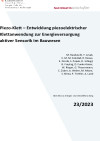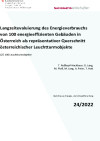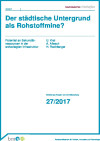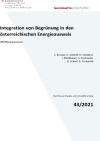Suchergebnisse für "Factsheet: Energietechnologien gestalten, die für alle sinnvoll und nutzbar sind"
DDM Feldkirchen
Demonstration von Digitalisierungsmaßnahmen in Wärmenetzen am Beispiel von Fernwärmenetz Feldkirchen.
Piezo-Klett: Entwicklung piezoelektrischer Klettanwendung zur Energieversorgung aktiver Sensorik im Bauwesen

Das vorliegende Projekt betrachtet Gebäude, Gebäudeteile und ihre Anschlüsse (Bauteilknoten) als Energiegeneratoren, indem durch die Anwendung der Klettverbindung in Kombination mit dem piezoelektrischen Effekt ein so genanntes Energy Harvesting betrieben wird.
Schriftenreihe
23/2023
M. Raudaschl, T. Levak, V. M. M. Soledad, R. Riewe, E. Drnda, S. Popek, D. Schlegl, B. Freytag, D. Funke-Kaiser, W. Rieger, G. Theuermann, C. Zuber, A. Weber, M. Moser, S. Klima, P. Treitler, A. Lund
Herausgeber: BMK
Deutsch, 89 Seiten
Downloads zur Publikation
SURO - Der städtische Untergrund als Rohstoffmine? Potential an Sekundärressourcen in der erdverlegten Infrastruktur
Machbarkeit eines Ressourcenkatasters zur Inventarisierung, Charakterisierung und Verortung der Materialbestände in den erdverlegten Infrastrukturnetzwerken österreichischer Stadtregionen. Das Ergebnis dient der ökonomischen Bewertung von Sekundärrohstoffpotenzialen.
Urbaner Kältebedarf in Österreich 2030/2050 (UKÖ 2030/2050)
Systematische Aufarbeitung des steigenden Kühlbedarfs und Darstellung der geographischen Verortung des Kältebedarfs in Österreich. Das Ergebnis dient als Entscheidungshilfe bei der Entwicklung von Klimaschutzmaßnahmen und Klimawandelanpassungsstrategien sowie eine Abschätzung zum Kältebedarf der Zukunft.
Langzeitevaluierung des Energieverbrauchs von 100 energieeffizienten Gebäuden in Österreich als repräsentativer Querschnitt österreichischer Leuchtturmobjekte (LZE 100 Leuchtturmobjekte)

Erfassung, Auswertung und Analyse von Energieverbrauchsdaten von 100 energieeffizienten Gebäuden in Österreich über eine Betriebszeit von 3 bis 25 Jahren als repräsentativer Querschnitt der österreichischen Leuchtturmobjekte. Differenzierung nach Gebäudetypen, Energieträger und Ermittlung der realen Treibhausgas-Emissionen. Vergleich der gemessenen Verbräuche zu Benchmark-Werten.
Schriftenreihe
24/2022
T. Roßkopf-Nachbaur, G. Lang, M. Ploß, M. Lang, A. Peter, T. Hatt
Herausgeber: BMK
Deutsch, 143 Seiten
Downloads zur Publikation
Der städtische Untergrund als Rohstoffmine? Potential an Sekundärressourcen in der erdverlegten Infrastruktur

Machbarkeit eines Ressourcenkatasters zur Inventarisierung, Charakterisierung und Verortung der Materialbestände in den erdverlegten Infrastrukturnetzwerken österreichischer Stadtregionen. Das Ergebnis dient der ökonomischen Bewertung von Sekundärrohstoffpotenzialen.
Schriftenreihe
27/2017
U. Kral, A. Allesch, H. Rechberger
Deutsch, 73 Seiten
Downloads zur Publikation
Integration von Begrünung in den österreichischen Energieausweis (GREENergieausweis)

Anpassung der Berechnungsmodelle im Energieausweis derart, dass Gebäudebegrünung darin möglichst realistisch abgebildet werden kann und Abschätzung zur Akzeptanz einer Umsetzung bei relevanten Stakeholdern.
Schriftenreihe
43/2021
C. Kresser, E. Schriefl, H. Schöberl, I. Mühlbauer, S. Formanek, B. Scharf, G. Frühwirth
Herausgeber: BMK
Deutsch, 71 Seiten
Downloads zur Publikation
BIMstocks - Digital Urban Mining Platform: Assessing the material composition of building stocks through coupling of BIM to GIS
The main goal of BIMstocks is the development of a method for the digital capturing of the material composition of the existing building stock for follow up modelling of an Urban Mining Platform as well as for the prediction of the recycling potentials.
BIMpeco - Environmentally relevant product data in collaborative BIM environments
Construction products can pose a risk to the environment and health due to their pollutant content or releases. In the BIMpeco project, workflows and data structures for digital information management of this environmentally relevant product data are developed. For this purpose, the new ISO standards ISO 23387 and ISO 19650-1 are tested and synchronized with established process flows. The project results will be made available on an open-source basis and can be integrated into any Common Data Environment (CDE) that complies with the standards mentioned. The BIMpeco project is the first to lay the foundations for product information management of environmentally relevant properties in the CDE, covering the entire lifecycle and supply chain.
BIM2BEM Flow - Continuous BIM-based energy efficient planning
Automated integration and assignment of exchange requirements between the design and simulation programs, based on the elaborated exchange information requirements, should enable continuous energy efficiency planning along the design phase.
digiactiv - digital transformation for more interactivity in MEP-(mechanical, electrical and plumbing-)planning
The aim of the digiactiv project is to improve the interoperability between the different stakeholders in the building construction sector using open and neutral semantic data models. With digital transformation processes, digiactiv helps to increase the quality of planning and the operation of buildings, as well as to minimize the interface risk between various stakeholders.
AFOM - Automatic failure and optimisation analysis by data-acquisition
In the project, methods will be developed for analysing measured value curves to detect changes in operation or failures in the system. By integrating BIM data of buildings, corresponding models will be generated to validate the heating, ventilation, and air conditioning (HVAC)-networks, which will be used for analysis.
KityVR - Artificial intelligence techniques to implement CityGML models and VR visualization
The goal of the project is to link 3D city models and virtual reality for energy-relevant applications as key-enabler for digital planning, construction and operational management. Missing data will be calculated using statistical enrichment methods.
BTTAB - Broad-based testing of energy-efficient demonstration buildings with thermally activated building components
Buildings with thermal building component activation that have not yet been researched in as many federal states and application categories as possible will be monitored, which will include operating data as well as the experiences of those involved. The aim of this study is to take a general look at the various applications of the thermal building component activation technology and to evaluate and compare the pilot projects with the help of suitable evaluation criteria.
VR4UrbanDev - Virtual Reality as an innovative, digital tool for the integrative urban development of the future
Virtual reality (VR) has the potential to make complex issues more quickly comprehensible and directly tangible. In the VR4UrbanDev project, we are using this potential for energy planning processes for buildings and urban districts. On the basis of test areas, we develop methods for importing and visualising energy-related real-time data and simulation data in the VR environment.
StromBIZ - demonstration projects: business models for decentralized electricity generation and distribution
Feasible business models to utilize locally generated renewable energy are expected to induce a tipping point for the "Energy Turnaround" in Austria. Within the proposed project a number of demonstration PV plants on residential and non-residential buildings had been realized. On this basis new approaches of business cases had been developed, implemented, tested and disseminated.
ÖKO-OPT-QUART - Economically optimized control and operating mode of complex energy networks of future city districts
In the project ÖKO-OPT-QUART energy-based, economic and control-orientated models will be developed in order to simulate the operating mode of complex, sustainable energy networks in city districts. For an exemplary configuration these models will be combined to an overall model which allows a realistic economic comparison of different control strategies. The final goal of the project is the development of a method for the systematic design of cost-optimized, predictive control strategies for complex energy networks in city districts.
see-it - Camera based, user centric daylight control system for optimized working conditions
In the project technologies in the field of building construction and building automation are being researched for quality and performance improvements in the workplace. The aim is to individualize the control of sun protection to the people who need to be protected from glare and overheating and hope to see through.
openBAM - Open Building Automation Modelling - Open modeling of building automation over the entire building life cycle
Platform-independent modeling of control and regulation logic for detailed study of building automation systems involving construction and building technology. The result enables the analysis of energy saving potentials through building automation before construction.
REal - The laboratory for Integrated Regional Renewable Energy Systems
In the REal project, a holistic, scalable and user-friendly concept is created, whereby sector-coupled, municipal energy systems with 100% renewable energy can be implemented, considering all necessary aspects from planning to operation, reducing design costs and accelerating an Austria-wide implementation.
